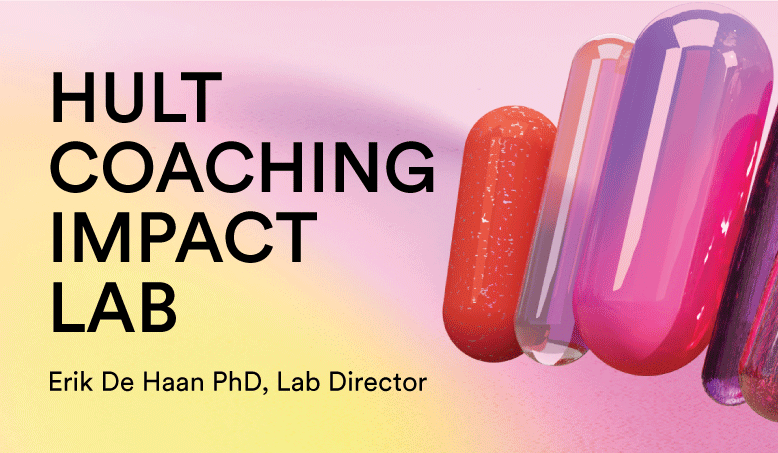Following Chief Academic Officer, Johan Roos’, announcement that Hult is renewing its research strategy to prioritize impact and launching three new Impact Labs, the long-established Hult Ashridge Center for Coaching will be continuing its work under the umbrella of Hult Impact Research and the Coaching Impact Lab. Here, the Center’s Director, Erik de Haan, outlines the outstanding contribution the Center has made to the field of executive coaching.
In 2005 we created the Ashridge Center for Coaching to provide a central focus or hub for all the activities we were doing in and related to the area of executive coaching. At that point, our faculty were providing coaching to senior managers in all sectors, but we were also busy developing new and experienced coaches and preparing them for their professional accreditation. Finally, we were rewriting standards for the coaching profession and we were embarking on exciting research in the executive-coaching domain.
Now in 2023, I am proud to say that the Hult Ashridge Center for Coaching has become an internationally recognized center of excellence in the field of executive coaching. We are seen as a leading innovator and provider of standards for the profession. Many hundreds of alumni have graduated from our postgraduate programs in executive coaching, in team coaching, and in coaching or organizational supervision.
We are seen as a leading innovator and provider of standards for the profession.
In the core area of coaching research and innovation, authors associated with the Hult Ashridge Center for Coaching have written some of the most influential articles and handbooks. Just to mention a few, there is the seven-part series of peer-reviewed articles on critical moments in executive coaching, which is a pioneering work in qualitative research. There is also the meta-analysis of randomized controlled studies in coaching that came out this year and comprised two of our own earlier original quantitative studies at the Centre for Coaching. Out of these important contributions in qualitative and quantitative research came two handbooks of research in executive coaching with Routledge, that provide comprehensive overviews of the research done in both main pillars of rigorous research (Critical Moments in Executive Coaching in 2019 and What Works in Executive Coaching in 2021).
I have always felt that executive coaching, as a method of organizational and leadership development through one-to-one conversations, lends itself particularly well to research, for two main reasons:
(1) Firstly, coaching is itself a form of research, where we are trying to understand fully and from many perspectives what the client is bringing to the sessions and we analyze what might be going on and what might be behind those client issues and queries. So, good coaching is always a form of qualitative research, making use of in-depth observation of data, hypothesis, and testing of the hypotheses, plus reformulation.
(2) Secondly, coaching sessions are very much like an intervention in a lab situation. All sessions take place in a neutral, protected, sound-proof area, and the coach does not have any other contact with the organization bar a small number of coaching sessions with the main client, the impact of which can be measured even by the hour. Thanks to the research done in our Center, we now have trusted dose-impact curves that show the diminishing relative impact per session of coaching, as was theoretically expected. Similarly rigorous ‘lab’ work cannot be done so easily with other forms of consulting or in leadership education and training, as they are a lot more messy, and have fluid, more permeable boundaries.
Executive coaching, as a method of organizational and leadership development through one-to-one conversations, lends itself particularly well to research.
I hope you will enjoy reading about our research and the standards that we propose. If you are a professional coach, I hope you will enjoy getting yourself involved with research as well—when you follow your questions and hypothesis per session through to a larger dataset and test the effectiveness of your interventions.
If you do, then I am sure that we will meet soon in the peer-review domain or at conferences.


